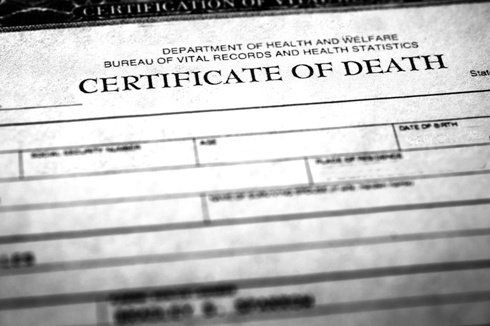What to Do After a Death...
Our Best Advice on What to Do Next.
To marshal the right help, you’ll need a checklist of all the things that need to be done, ranging from writing thank-you notes for flowers sent to the funeral to seeing a will through probate. AARP and Bayview Funeral Home provides you the following guidance.
To Do Immediately After Someone Dies
- Call Your Funeral Home/ Hospice/ Emergency Services.
The first step is an official pronouncement of death by legal authority. If your loved one died in a hospital or nursing home where a doctor was present, the staff will handle this. An official declaration of death is the first step to getting a death certificate, a critical piece of paperwork. But if your relative died at home, especially if it was unexpected, you’ll need to get a medical professional to declare them dead. To do this, call 911 soon after they pass and have them transported to an emergency room for pronouncement, or 911 can send out the proper pronouncing authorities.
If your family member died at home under the care of Hospice, a hospice nurse can declare them deceased. Without a declaration of death, you can’t plan a funeral, much less handle the deceased’s legal affairs.
- Tell friends and family
Send out a group text or mass email, or make individual phone calls, to let people know their loved one has died. To track down all those who need to know, go through the deceased’s email and phone contacts. Inform coworkers and the members of any social groups or church the person belonged to. Ask the recipients to spread the word by notifying others connected to the deceased. Put a post about the death on social media, both on your account and the deceased person’s accounts, if you have access. Bayview Funeral Home can post an obituary on our website for you at no cost, as detailed as you like, with a photo as well.
- Find out about existing funeral and burial plans
Ideally, you had the opportunity to talk with your loved one about his or her wishes for funeral or burial, if not, my best guidance is to look for a letter of instruction in the deceased's papers or call a family meeting to have the first conversation about what the funeral will look like. This is critical if they left no instructions. You need to discuss what the person wanted in terms of a funeral, what you can afford and what the family wants.
Within a Few Days of Death
• Preliminary Planning
Search the paperwork to find out if there was a prepaid burial plan. If not, you’ll need to decide on specifics like where the service will be, whether to cremate with fire or water, where the body or ashes will be interred and what type of tombstone or urn to order. If the person was in the military or belonged to a fraternal or religious group, contact the Veterans Administration or the specific organization to see if it offers burial benefits. Get help with the funeral. Line up relatives and friends to be pallbearers, to speak, to plan the service, to keep a list of well-wishers, to write thank-you notes and to arrange the post-funeral gathering. Get a friend or relative who is a wordsmith to write an obituary.
- Secure Property
Lock up the deceased's home and vehicle. Water the plants, get the mail and throw out the food in the refrigerator. If there are valuables, such as jewelry or cash, in the home, lock them up.
- Provide care for pets
Make sure pets have caretakers until there’s a permanent plan for them. Send them to stay with a relative who likes animals or board them at a kennel. The pet will be grieving, so be sure they’re with someone who can comfort them.
- Forward mail
Go to the post office and put in a forwarding order to send the mail to yourself or whoever is working with you to see to the immediate affairs. You don’t want mail piling up at the deceased’s home, telegraphing to the world that the property is empty. This is also the first step in finding out what subscriptions, creditors and other accounts will need to be canceled or paid. Going through the deceased person's mail is a practical way to see what the person’s assets and bills are. It will help you find out what you need to take care of.
- Notify your family member's Employer/Pension
Ask for information about benefits and any paychecks that may be due. Also inquire about whether there is a company-wide life insurance policy.
Two Weeks After Death
- Secure certified copies of death certificates
You’re going to need death certificates to close bank and brokerage accounts, file insurance claims and register the death with government agencies, among other things. Bayview Funeral Home can get copies on your behalf, or you can order them from the vital statistics office in the state in which the person died.
- Find the will and the executor
Your loved one’s survivors need to know where any money, property or belongings will go. Ideally, you talked with your relative before they died and they told you where they kept their will. If not, look for the document in a desk, a safe-deposit box or wherever they kept important papers. People usually name an executor (the person who will manage the settling of the estate) in their will. The executor needs to be involved in most of the steps going forward. If there isn’t a will, the probate court judge will name an administrator in place of an executor.
- Meet with a trusts and estates attorney
While you don’t need an attorney to settle an estate, having one makes things easier. If the estate is worth more than $50,000, Harbison suggests that you hire a lawyer to help navigate the process and distribute assets. In our experience, Estates get sticky fast, so get a professional.
- Contact a CPA
If your loved one had a CPA, contact them; if not, hire one. The estate may have to file a tax return, and a final tax return will need to be filed on the deceased’s behalf.
- Take the will to probate
Probate is the legal process of executing a will. You’ll need to do this at a county or city probate court office. Probate court makes sure that the person’s debts and liabilities are paid and that the remaining assets are transferred to the beneficiaries.
- Make an inventory of all assets
Laws vary by state, but the probate process usually starts with an inventory of all assets (bank accounts, house, car, brokerage account, personal property, furniture, jewelry, etc.), which will need to be filed in the court. For the physical items in the household, Harbison suggests hiring an appraiser.
- Track down assets
Part of the work of making that inventory of assets is finding them all. The task, called marshaling the assets, can be a big job. “For complex estates, this can take years,” Harbison says. There are search firms that will help you track down assets in exchange for a cut. Harbison recommends a DIY approach: Comb your family member’s tax returns, mail, email, brokerage and bank accounts, deeds and titles to find assets. Don’t leave any safe-deposit box or filing cabinet unopened.
- Make a list of bills
Share the list with the executor so that important expenses like the mortgage, taxes and utilities are taken care of while the estate is settled.
- Cancel services no longer needed
These include cellphone, streaming services, cable and internet.
- Decide what to do with the passport
You have a couple of options on how to deal with your family member’s passport. You do not have to return it; you can keep it as a memento, with the stamps on its pages reminding you of past adventures. If you’re worried about the possibility of identity theft, mail the passport to the federal government along with a copy of the death certificate and have it officially canceled. If you want the canceled passport returned, include a letter requesting that be done. You can also request the government destroy the passport after it’s canceled.
Notify the following of your loved one's death:
- The Social Security Administration: Be aware, when the Funeral Director files the death certificate, it WILL automatically notify Socail Security. If the deceased was receiving Social Security benefits, the system will catch itself later and pull the funds back from their account for the days they were not alive. Some family members, spouses and minor or diabled children, may be eligible for death benefits from Social Security. Contact your local SSA office to arrange this. The agency will also let Medicare know that your loved one died.
- Life insurance companies: You’ll need a death certificate and policy numbers to make claims on any policies the deceased had.
- Banks, financial institutions: If you share a joint account with your deceased loved one, you’ll need to notify the bank they’ve died. Most bank accounts carry automatic rights of survivorship, which means if your name is on the account, you have full access to the funds when your loved one dies. You become the sole owner on the date of your relative’s death. Most banks will require a death certificate to remove the relative from the account If the deceased person was the sole owner of a bank account, the bank will release funds to the person named beneficiary once it learns of the account holder’s death. Many banks let their customers name a beneficiary or set the account as Payable on Death (POD) or Transferable on Death (TOD) to another person. You’ll need to show the bank a death certificate to get the funds released. If the owner of the account didn’t name a beneficiary or POD, things get more complicated. The executor will be responsible for getting the funds to repay creditors, pay bills and divide funds according to the dead person’s will.
- Financial advisers, stockbrokers: Determine the beneficiary listed on accounts. Depending on the type of asset, the beneficiary may get access to the account or benefit simply by filling out appropriate forms and providing a copy of the death certificate (no executor needed). While access to the money is straightforward, there are tax consequences to keep in mind. You will be responsible for paying any taxes earned by the account once your loved one dies. Keep in mind, the tax burden could be significant on a well-funded investment account.
- Credit agencies: To prevent identity theft send copies of the death certificate to one of the three major credit bureaus: Equifax, Experian or TransUnion. You only need to tell one of them, and it will tell the others.
- Cancel driver's license: This removes the deceased’s name from the records of the department of motor vehicles and prevents identity theft. Contact the agency for specific instructions, but you’ll need a copy of the death certificate. Keep a copy of the canceled driver’s license in your records. You may need it to close or access accounts that belonged to the deceased.
- Close credit card accounts: Contact customer service and tell the representative that you’re closing the account on behalf of a deceased relative who had a sole account. You’ll need a copy of the death certificate to do this, too. Keep records of accounts you close and inform the executor of any outstanding balances on the cards. Credit bureaus, as part of their regular reporting process, will also send card issuers an alert that your relative has died. But if you want credit accounts notified faster, contact them directly. Be sure to cut up your dead loved one’s credit cards so they aren’t lost or stolen. If the credit card account is shared with another person who intends to keep using it, keep the account open but notify the issuing bank your relative has died so the deceased’s name can be removed from the account. Destroy any cards with their name on them to prevent theft and identity fraud.
- Terminate insurance policies; Contact providers to end coverage for the deceased on home, auto and health insurance policies, and ask that any unused premium be returned.
- Delete or memorialize social media accounts; You can delete social media accounts, but some survivors choose to turn them into a memorial for their loved one instead. Twitter, Facebook and Instagram all allow a deceased person’s profile to remain online, marked as a memorial account. On Facebook, a memorialized profile stays up with the word “Remembering” in front of the deceased’s name. Friends will be able to post on the timeline. Whether you choose to delete or memorialize, you’ll need to contact the companies with copies of the death certificate. TikTok does not offer a memorial option for a deceased user’s account.
- Close email accounts; To prevent identity theft and fraud, shut down the deceased’s email account. If the person set up a funeral plan or a will, she may have included log-in information so you can do this yourself. If not, you’ll need copies of the death certificate to cancel an email account. The specifics vary by email provider, but most require a death certificate and verification that you are a relative or the estate executor.
- Update voter registration; Contact your state or county directly to find out how to remove your dead relative from the voting rolls. Here’s a state-by-state contact list. The rules vary by state. Some states will remove your dead relative from voter registration rolls automatically when the funeral home notifies Social Security. States will also remove voters if a relative notifies them of the death. Depending on where your loved one was registered to vote, you may need to give notice of the death in writing, by affidavit or with a death certificate.
DEATH CERTIFICATES CAN TAKE ANYWHERE FROM 7 to 14 BUSINESS DAYS TO ARRIVE AT THE FUNERAL HOME AFTER THE DOCTOR HAS SIGNED THE RECORD.










